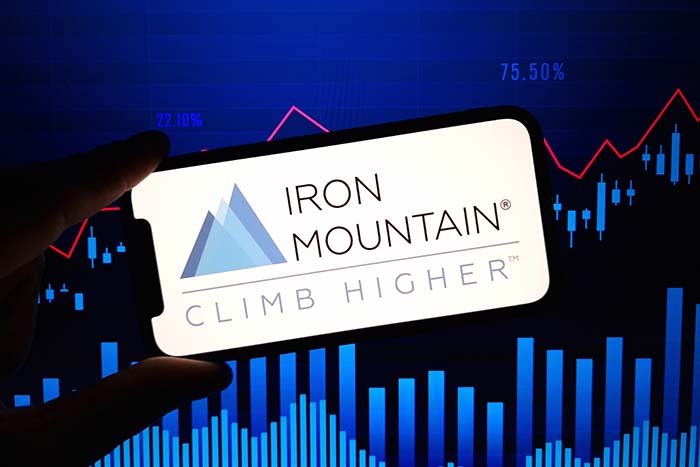Iron Mountain (NYSE: IRM) has been on an absolute tear lately.
This global leader in storage and information management services isn’t exactly a flashy tech stock. It’s more like the dependable workhorse of the business world.
But lately, investors have been piling in and driving the stock to new heights. The share price has more than doubled over the past couple of years, soaring from just under $50 at the start of 2023 to over $120 today.

But has this steady Eddie of the real estate world climbed too high? Let’s run it through The Value Meter and see what we find.
Iron Mountain’s enterprise value-to-net asset value (EV/NAV) ratio sits at 406.1, which is astronomically higher than the average of 6.35 for companies with positive net assets. That’s very hard to make sense of if you’re a value-conscious investor.
Worse still, Iron Mountain only managed to generate positive free cash flow in one of the past four quarters. Its average quarterly free cash flow was -27.42% of its net assets. That’s even worse than the -9.05% average for companies with similar cash flow struggles.
However, digging deeper into the numbers, we do see some reasons for optimism.
In its second quarter earnings report, Iron Mountain posted record quarterly revenue of $1.5 billion, up 13% year over year. Adjusted EBITDA (earnings before interest, taxes, depreciation, and amortization) hit $544 million, a 14% increase.
CEO William Meaney highlighted strong execution across all business segments. Iron Mountain’s Project Matterhorn strategy seems to be paying off, driving growth in both traditional storage and newer digital solutions, and the company’s data center business is booming, with 66 megawatts leased in the most recent quarter alone.
But as you can imagine, there are some red flags too. Iron Mountain’s total long-term debt as of the end of the second quarter stands at a hefty $12.8 billion, offset by only $144 million in cash on hand.
On a positive note, the company has lowered its net lease-adjusted leverage to 5.0, the lowest level since 2014. That means its net debt is down to about five times its annual earnings before interest, taxes, depreciation, amortization, and rent.
The company also increased its quarterly dividend by 10%, which is great for income investors (but it could strain the company’s cash flow if growth slows).
All in all, there’s no doubt Iron Mountain is a solid company with a proven track record. Its core business of physical document storage is pretty steady. But while its heavy investments in data centers and other digital solutions could pay off big-time down the road, they’re eating into its cash flow for now.
The current valuation also seems to be pricing in a lot of future growth. There’s not much margin of safety at these levels, especially given the stock’s rapid ascent.
If you already own shares, you might want to hold on for that sweet dividend. But new investors should probably wait for a serious pullback before jumping in.
For now, The Value Meter rates Iron Mountain as “Slightly Overvalued.”

What stock would you like me to run through The Value Meter next? Post the ticker symbol(s) in the comments section below.
